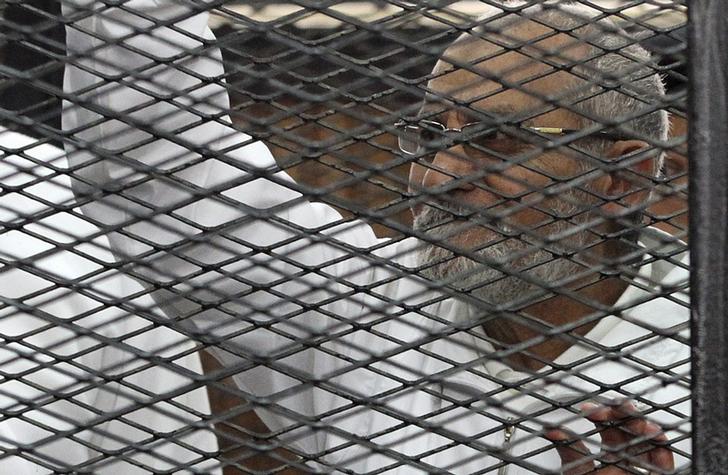Latest NEWS
- Aswat Masriya, the last word
- Roundup of Egypt's press headlines on March 15, 2017
- Roundup of Egypt's press headlines on March 14, 2017
- Former Egyptian President Hosni Mubarak to be released: lawyer
- Roundup of Egypt's press headlines on March 13, 2017
- Egypt's capital set to grow by half a million in 2017
- Egypt's wheat reserves to double with start of harvest -supply min
- Roundup of Egypt's press headlines on March 12, 2017
Court of Cassation to rule on Badie's "guidance bureau" case retrial on Jan. 4

Muslim Brotherhood leader Mohammed Badie looks on from the defendants cage during his trial with other leaders of the group in a courtroom in Cairo December 11, 2013. REUTERS/Stringer
CAIRO, Dec. 7 (Aswat Masriya) - The Court of Cassation postponed Monday its ruling on a retrial appeal submitted by the Muslim Brotherhood's Supreme Guide, his deputy and 13 other defendants in the "Guidance Bureau" case to Jan 4.
The appeal was presented by the Court of Cassation's prosecution which requested the retrial of Mohamed Badie, his deputy Khairat al-Shater and 13 others in a case involving armed conflict between members of the now banned Muslim Brotherhood and protesters, which took place outside the group's headquarters on June 30 and July 1, 2013 during protests against then-Brotherhood President Mohamed Mursi.
Last February, a Cairo court sentenced Badie and Shater to life imprisonment for inciting violence which at the group's headquarters which left 12 people dead and more than 90 injured.
In the same case, four other Muslim Brotherhood figures, Mohamed al-Beshlawi, Mostafa Fahmy, Atef Abdel Gelil and Abdel Rehim Mohamed, were also sentenced to death.
All 18 defendants were charged with premeditated murder, attempted murder, possession of explosives and firearms and incitement to murder.
Last week the Court of Cassation accepted an appeal submitted by Badie and 37 others sentenced to death and life imprisonment in what is known as the Rabaa al-Adaweya "operations room" case.
The court ordered a retrial for all the defendants before another court.
Badie and 50 others are accused of running an "operations room ... to direct the Muslim Brotherhood group to resist the state during the Rabaa [Al-Adaweya] sit-in dispersal."
He was sentenced to death in this case.
The government has launched a severe crackdown on Muslim Brotherhood figures following the ouster of former president Mohamed Mursi in July 2013, after mass protests against his rule.
The crackdown peaked in August 2013 when authorities dispersed two sit-ins at Rabaa Al-Adaweya and Nahda Square, both supporting Mursi.
The violent dispersal of both sit-ins was condemned by human rights organizations and was described by Human Rights Watch as "likely amounted to crimes against humanity" as it left at least 1,000 people dead.
Hundreds of Brotherhood supporters and members have been sentenced to death or handed life sentences in what many rights organizations have described as politically-motivated trials that lack due process.










